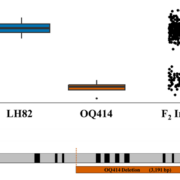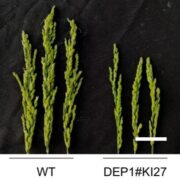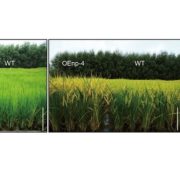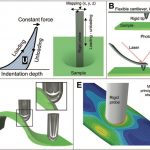Opinion: Towards lowering crop N requirement (Plant Cell Environ)
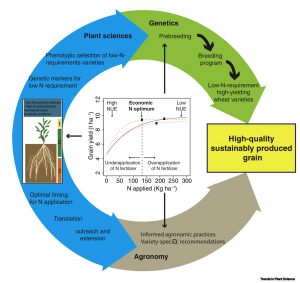 Current and future food production demands a lot of nitrogen (N) fertilizers. Inefficient N fertilization leads to N losses to the environment and generates greenhouse gases that cause environmental problems. In a recent article, Swarbreck and colleagues discuss a strategy to develop crop varieties with low N requirement; this approach would need strong collaboration between farmers, breeders, and plant scientists, as described below. Lowering global N application requires changes in farmer decisions: when, how and how much fertilizer to apply. These decisions are affected by the fertilizer cost, crop system, and market demands. In this sense, agronomic information and training could have a great impact. Plant breeders should evaluate lines in both high- and low-N conditions. Ideally, new varieties should have a low N optimum (the N level necessary to achieve a high yield). Finally, plant scientists can continue to elucidate N responsiveness at the molecular level. Some advances have been made in establishing how internal and external N levels are monitored by the plants, and how those signals are transduced into a phenotypic response. (Summary by Humberto Hererra-Ubaldo) Trends Plant Sci. 10.1016/j.tplants.2019.06.006
Current and future food production demands a lot of nitrogen (N) fertilizers. Inefficient N fertilization leads to N losses to the environment and generates greenhouse gases that cause environmental problems. In a recent article, Swarbreck and colleagues discuss a strategy to develop crop varieties with low N requirement; this approach would need strong collaboration between farmers, breeders, and plant scientists, as described below. Lowering global N application requires changes in farmer decisions: when, how and how much fertilizer to apply. These decisions are affected by the fertilizer cost, crop system, and market demands. In this sense, agronomic information and training could have a great impact. Plant breeders should evaluate lines in both high- and low-N conditions. Ideally, new varieties should have a low N optimum (the N level necessary to achieve a high yield). Finally, plant scientists can continue to elucidate N responsiveness at the molecular level. Some advances have been made in establishing how internal and external N levels are monitored by the plants, and how those signals are transduced into a phenotypic response. (Summary by Humberto Hererra-Ubaldo) Trends Plant Sci. 10.1016/j.tplants.2019.06.006


